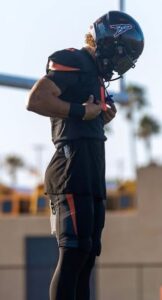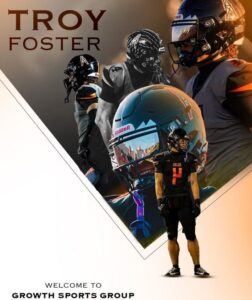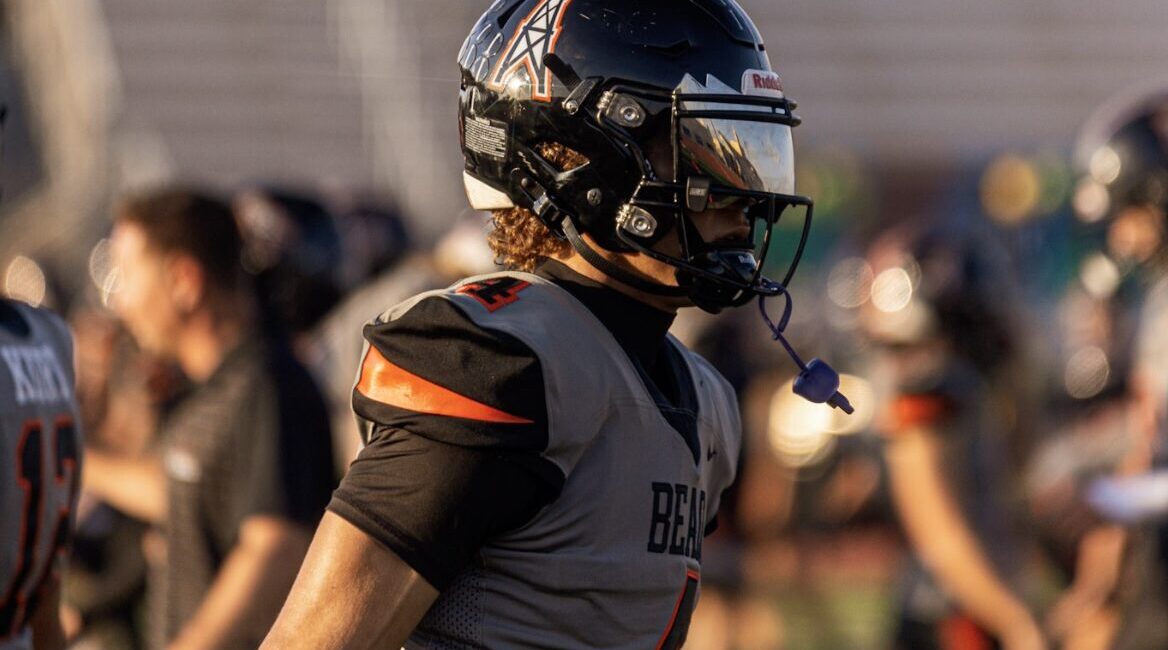By Bill Prentice, Reporter/Columnist for RepMax Media | May 2, 2025
Across Southern California’s competitive high school football landscape, Troy Foster has emerged as one of the most talked-about prospects, the standout wide receiver whose remarkable combination of size, speed, and technical skill is turning the heads of college scouts and making him one of Huntington Beach High School’s most promising talents.
In an exclusive interview with RepMax Media, Foster opens up about his inspirations, his playing philosophy, and what he’s looking for in his college recruitment process. With college coaches increasingly valuing versatile receivers who can create mismatches across the field, Foster represents the new prototype that programs are eagerly pursuing.
Meet Troy Foster: The Multidimensional Threat
Troy Foster isn’t your typical wide receiver. Standing out on the Huntington Beach High School football team, Foster has established himself as a dominant force on the field. Beyond football, he’s

also a track athlete, utilizing that speed training to enhance his performance on the gridiron.
What separates Foster from other receivers is his well-rounded approach to the position. “I play wide receiver because of my size, physicality, hands, and route running which separate me from the rest,” Foster explains. “I am a guy who can line up wherever on the field and make plays and someone who is going to score you points.”
This versatility makes him a nightmare for defensive coordinators who struggle to match up with a receiver who combines size with technical route-running ability.
“I play wide receiver because of my size, physicality, hands, and route running which separate me from the rest. I am a guy who can line up wherever on the field and make plays.” – Troy Foster
Family Motivation and Balancing Elite Athletics
Behind every successful athlete is often a powerful source of motivation. For Foster, that inspiration comes from home.
“My Mom definitely inspires me the most to keep pushing and working towards my goals each and every day,” Foster shares with genuine emotion. “I want to be able to give her the best life possible.”
This family-driven motivation fuels Foster’s disciplined approach to managing the demanding schedule of an elite prospect. When asked about balancing academics, training, and personal life, Foster emphasizes the importance of structure.
“Having a set schedule of your trainings and all the things you need to get done for the week. You have to find a balance between school, workouts and your personal life and there are some sacrifices that are going to have to be made.”
For young athletes struggling with similar challenges, what sacrifices have you found most difficult to make while pursuing athletic excellence?
“My Mom definitely inspires me the most to keep pushing and working towards my goals each and every day. I want to be able to give her the best life possible.” – Troy Foster
Professional Influences and Redefining the Position
 The evolution of the wide receiver position in recent years has opened doors for players like Foster, who don’t fit the traditional mold. When discussing his professional inspirations, Foster points to current NFL stars who have changed perceptions.
The evolution of the wide receiver position in recent years has opened doors for players like Foster, who don’t fit the traditional mold. When discussing his professional inspirations, Foster points to current NFL stars who have changed perceptions.
“I look up to guys like AJ Brown and DK Metcalf,” Foster explains. “These guys have shown that just because you are a bigger receiver doesn’t mean you’re slow and can’t move. Both do a great job of showcasing breakaway speed, route running and excellent body control.”
This model of the modern “big receiver” with movement skills has transformed offensive schemes at all levels of football. Coaches now seek players who can win with physicality at the catch point while still threatening defenses vertically—exactly the skill set Foster is developing.
Foster’s dual-sport approach, competing in track alongside football, further enhances this development. The combination of power and speed training creates the athletic profile that has become so coveted at the next level.
“I look up to guys like AJ Brown and DK Metcalf. These guys have shown that just because you are a bigger receiver doesn’t mean you’re slow and can’t move.” – Troy Foster
Team Leadership and College Recruitment Priorities
As Foster navigates his high school career, his approach to team dynamics reflects maturity beyond his years. When asked about his contribution to team success, he emphasizes accountability.
“I contribute to my team’s success by doing my part on the field. If everyone can do their 1/11 the team will be successful,” Foster states. “I strive to be the guy that the younger kids can look up to.”
This “do your job” mentality paired with leading by example demonstrates why coaches at the next level would value not just Foster’s physical tools, but his approach to the game.
Looking ahead to his college decision, Foster has clear priorities that guide his recruitment process:
“The top three things I look for when choosing a college is number one the coaching staff. I want to be coached by people who are not only going to get me better and develop me for the next level but also coaches who I have a strong genuine relationship. I also look for a school with good academics and a place where I fit into their offensive scheme.”
While atmosphere and game-day experience factor into his decision, Foster maintains perspective on what matters most. “I wouldn’t say it has a huge impact on my decision but it definitely plays a factor. I want to be in a place where the fan base is super supportive of the team and a place where the game atmosphere is incredible. That just makes the games and college experience that much better.”
What aspects of college football programs do you think recruits sometimes overlook that could be crucial to their development?
Coaching Philosophy and Training Environment
The relationship between player and coach can make or break athletic development. Foster shows remarkable self-awareness in understanding what coaching style brings out his best performance.
“Definitely a mix of both [strict and player-friendly] because you need a coach who is going to get on you and push you to be your best self but you also need a guy who is able to make the football environment an enjoyable place,” Foster explains.
This preference extends to his ideal training environment as well, where Foster values both competitive intensity and technical development. When asked to describe his preferred practice setting, Foster simply states he prefers “A mix of both” high-intensity competition and skill-focused drills.
Foster’s coaching preferences align with modern player development models that balance accountability with positive reinforcement. He specifically notes a preference for coaches who “prioritize player development and long-term team growth because when you focus on growth and getting better the winning will come.”
This growth mindset has become increasingly valued in college programs looking to build sustainable success rather than quick fixes.
Key Insights from Troy Foster’s Approach
Foster’s interview reveals several valuable takeaways for young athletes:
- Balance size with skill – Foster understands that physical gifts must be paired with technical development to truly excel
- Family motivation creates purpose – His desire to provide for his mother gives deeper meaning to daily sacrifices
- Structure enables balance – A disciplined schedule allows him to manage multiple sports and academics
- Team success comes from individual accountability – Doing your “1/11” consistently leads to collective achievement
- Development-focused coaching produces sustainable results – Foster values growth over immediate winning
The Road Ahead for Foster and Huntington Beach Football
 As Troy Foster continues his high school career at Huntington Beach, his combination of physical tools, mature mindset, and clear vision for his future makes him a prospect worth watching closely. His dual-sport approach provides a valuable template for young athletes looking to maximize their athletic development.
As Troy Foster continues his high school career at Huntington Beach, his combination of physical tools, mature mindset, and clear vision for his future makes him a prospect worth watching closely. His dual-sport approach provides a valuable template for young athletes looking to maximize their athletic development.
For college recruiters, Foster represents the modern prototype at the wide receiver position—a physically imposing player who can create mismatches with both power and finesse. As schemes continue to evolve at all levels of football, players with Foster’s versatility become increasingly valuable.
What qualities do you think separate good high school athletes from those who successfully transition to the college level? Share your thoughts in the comments below!
Follow Troy Foster’s journey on RepMax Media as we continue to cover his development and recruitment process.
Related Topics: Huntington Beach High School Football, Wide Receiver Development, College Football Recruiting, Dual-Sport Athletes
Bill Prentice is a Reporter/Columnist for RepMax Media specializing in high school and collegiate athletics. You can reach him at [email protected].
